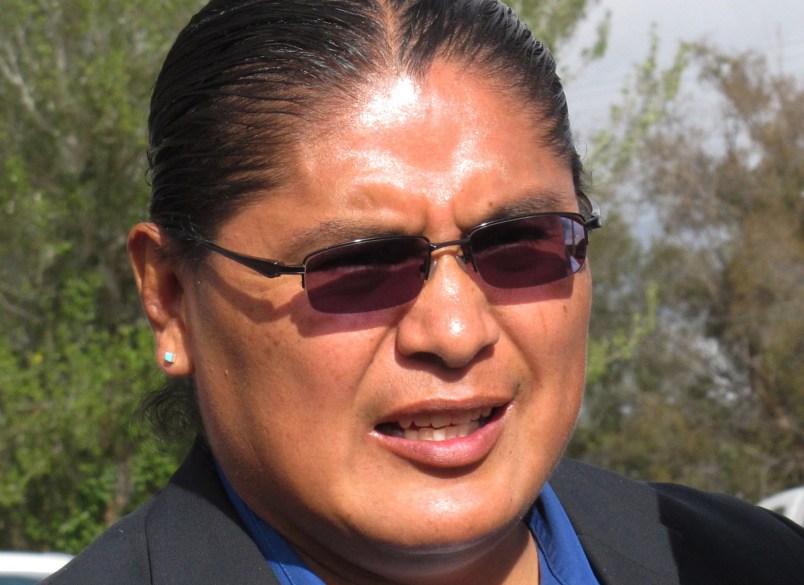FLAGSTAFF, Ariz. (AP) — A Navajo presidential candidate disqualified from the race is holding out hope that election officials and tribal lawmakers will provide a way for him to remain on the ballot, despite the long odds.
The Navajo Nation’s highest court dismissed an appeal from Chris Deschene on Wednesday, all but ending his bid for office on the nation’s largest Indian reservation. The dismissal makes final an order from a lower court that disqualified Deschene because he cannot speak fluent Navajo.
Tribal law requires presidential candidates to be fluent in the language, a defining part of Navajo culture.
Deschene declared Wednesday that his candidacy is not over. He asked supporters to back legislation on the Navajo Nation Council’s agenda this week that would make voters the sole decision-makers when it comes to determining a presidential candidate’s fluency.
The emergency legislation is written to apply retroactively to the 2014 election but is subject to amendments. It’s unclear whether it could undo a Supreme Court ruling.
Delegate Leonard Tsosie said he co-sponsored the bill because he’s concerned about disenfranchising voters who already have picked who they want as their next leader. He said the bill will bring some finality to the election.
“It’s just getting more chaotic by the day,” he said.
Delegate Dwight Witherspoon said he doesn’t believe the legislation fits the definition of an emergency, which allows bills to bypass committee action and a public comment period.
“It’s done to try to benefit one individual,” he said.
The tribe’s presidential election is scheduled for Nov. 4. An attorney for the Tribal Council and election officials, Levon Henry, said it probably will be postponed.
However, absentee ballots giving voters a choice between Deschene and former President Joe Shirley Jr. already have gone out, and early voting is underway.
Henry said election officials are awaiting a Supreme Court decision on a petition in a separate but related case that seeks to enforce the disqualification order before making any changes to the election. The order requires that election officials move up the third-place finisher from the primary election.
The Navajo Board of Election Supervisors is scheduled to meet Thursday. The supervisors have taken a stance on protecting the choice that Navajo voters made in the primary election, something Deschene is counting on as an avenue to stay in the race.
The high court dismissed Deschene’s appeal for not including a copy of his disqualification order with his appeal and said it would not reconsider its decision.
“Any litigant who is serious about his case will ensure that all of the court’s jurisdictional requirements are satisfied,” the justices wrote.
Justin Jones, an attorney for one of the men who challenged Deschene, said Deschene confused voters by not admitting that he couldn’t speak fluent Navajo.
“There’s nothing wrong with that,” Jones said. “A lot of people don’t know how to speak their own language, but there’s a law that you have to comply with.”
Deschene has said he is proficient in the language. He refused to take a fluency test, or answer questions in a deposition or as a witness in the case against him. He said it was unfair that he be singled out and tested on his language ability.
Richie Nez of the tribe’s Office of Hearings and Appeals said he had no choice but to disqualify Deschene after he failed to prove he could speak fluent Navajo.
Deschene came in second to Shirley in the August primary, but his campaign has been overshadowed by questions regarding his fluency in Navajo.
According to the U.S. Census Bureau, more people speak Navajo than any other single American Indian language. More than half of the Navajo Nation’s members speak the language.
Copyright 2014 The Associated Press. All rights reserved. This material may not be published, broadcast, rewritten or redistributed.



